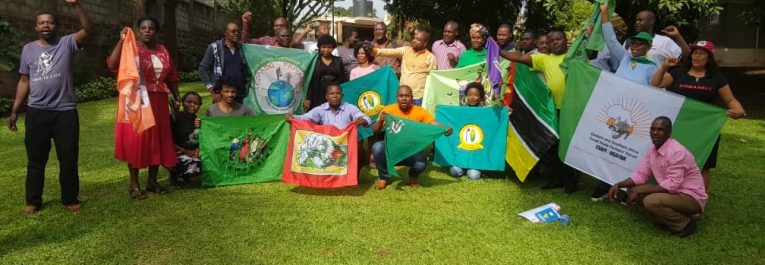
23 JULY 2019
La Via Campesina southern and eastern Africa (LVC SEAf) is in solidarity with the communities of Mozambique, Malawi and Zimbabwe affected by Cyclone Idai and Kenneth in March and April respectively, killing over a thousand people. Many peasants, women and men, children were displaced and are still in need of urgent support and assistance to rebuild their lives following the massive destruction of homes and crops. These cyclones which are not common in the southern hemisphere also affected the African Island nations in the Indian Ocean.
Our member organizations, Zimbabwe Smallholder Organic Farmers Forum (ZIMSOFF) in Zimbabwe and União Nacional de Camponeses (UNAC) in Mozambique were affected mostly by Cyclone Idai and lost many family members, livestock and crops. All this is happening at a time when in Zimbabwe and some parts of Mozambique and some southern and eastern African countries are experiencing a severe climate change-related drought. Most crops have been written-off and millions of people are reported needing urgent food assistance.
The two cyclones made landfalls in Mozambique: Idai on the 14th of March and Kenneth on the 25th of April affecting central and northern provinces respectively. The cities of Beira and some parts of Pemba were extensively damaged, some parts submerged for days. Idai was more destructive of the two cyclones. When Cyclone Kenneth made landfall, the Mozambique government had already evacuated areas on its path.
Many peasant communities in the three countries of Malawi, Mozambique and Zimbabwe on the path of Cyclone Idai were destroyed: livestock and crops swept away, and villages left desolate. The death toll of over 1,000 in 3 countries was recorded. In Mozambique, an outbreak of cholera worsened the plight of the displaced people. Many affected people lack clean drinkable water. The road and communication infrastructure was damaged making most places inaccessible hampering the delivery of much-needed assistance. Sofala, Manica, Zambezia and Tete areas in Mozambique were most affected as they are criss-crossed by major rivers that empty their waters into the Indian Ocean. These areas experienced excessive flooding. In Zimbabwe, Manicaland province which shares borders with Mozambique was affected. In Malawi, whole villages in the southern region were completely submerged, and at least 60 deaths recorded because of comparably better level of preparedness, in stark contrast with what happened in Mozambique and Zimbabwe.
It is in times such as these when we witness numerous unprecedented natural disasters, most of which experts have attributed to climate change, we pose the following question: when will the governments change their mindset to address the climate crisis before it is too late? We recognize the disaster preparedness and disaster risk reduction mechanisms which have been put in place. The recent history has shown us that these mechanisms are not able to stop calamities both in developed and developing countries. The solution to the climate crisis is known to all: to reduce greenhouse gases emissions by cutting fossil fuel use and replacing destructive capitalism. There is also an urgent need to transform our society in terms of how we produce, process, distribute and consume food – food sovereignty and agroecology are foundational to building such a society. The current industrial agricultural model is destructive and aggravates the climate crisis.
Important efforts by the national governments and by citizens of the affected countries were made to mobilize support (clothing, medical, food, cash etc.) and helped the affected people. In all countries the national government has taken over all humanitarian and emergency aid support to the victims, making it difficult for civil society to reach some of the communities directly. We are concerned about reports of misuse, theft of emergency aid and discriminatory distribution of support based political patronage. We call upon all the governments to help and support without discriminating all the affected people to the rebuild of their lives and communities.
